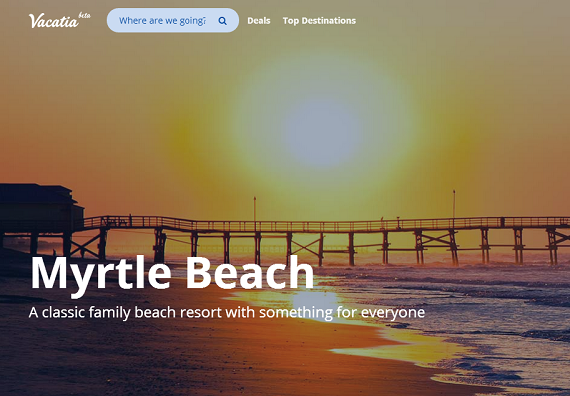
Let’s be honest here: timeshares do not have the best reputation. But that seems to have more to do with the people selling them than the idea behind them. In a down economy, and for people without a lot of money, a timeshare can actually make sense. If there was a better way to guarantee that the place you were buying was actually as advertised, then more people would probably be willing to buy them.
Vacation rental listing and management company Vacatia wants to bring the timeshare industry online, and make it respectable. The company has now raised $5 million in seed funding, it was announced Wednesday.
The round, which includes a convertible note raised last year, came from a slew of industry professionals, including Spencer Rascoff, CEO of Zillow; Erik Blachford, former CEO of Expedia; Greg Waldorf, Trulia director and former CEO of eHarmony; Thomas Byrne, former President of LoopNet; Robert Spottswood, founding board member of Hyatt Vacation Ownership, and Raymond L. “Rip” Gellein, Jr., who founded Vistana Resorts and was CEO of Starwood Vacation Ownership.
In addition, professional investors such as Barry Sternlicht and Steve Hankin of Starwood Capital, Egon Durban of Silver Lake, Douglas Dillard, Jr. of Standard Pacific Capital and Gene Frantz of Google Capital invested personally in the round. Venture capital firms Maveron, Bee Partners, Peterson Ventures and Meyer Ventures also participated.
The money will go toward infrastructure, as well as platform and content development, and marketing, Vacation founder and CEO Keith Cox told me in an interview.
The money will also go toward building up the team. Vacatia recently hired Alex Gamburg, the former Director of Search Marketing at Trulia, to be its new Director of Online Marketing, as well as Eve Pennington as its Director of Product,
The next layer of hires will include supply analysts and marketing analysts, as well as a buildup of the company’s customer service organization and support capabilities, Cox told me.
The San Francisco-based Vacatia, which is owned by Vacation Listing Service, is an online marketplace that brings buyers and sellers of timeshare and vacation ownership interests together.
It provides a platform for sellers to create and post listings, which buyers can then find, search and discover. The prospective buyers are able to make offers, and go through negotiations online with the seller, completing the transaction through Vacatia. Its an end to end marketplace.
In order to make sure that a resort is sufficiently trustworthy, Vacatia sends staff members to guarantee that the resort is as advertised. Those resorts that have been checked, and verified, get a Vacatia Guarantee.
A professional title company coordinates every sale on the site, and all funds are held in an escrow account. A licensed real estate agent monitors the entire process from beginning to end to ensure that the sale is seamless and secure.
Vacatia, which is coming out of beta on Wednesday, already has 15,000 postings from brokers, and 450 resorts in 16 destinations, including some in Florida, California, Hawaii, Mexico and Las Vegas.
What Vacatia is really about, Cox said, is simplifying the process of purchasing a timeshare, as well as making it more appealing to the next generation of potential owners, and to make it cheaper.
Unlike other timeshare marketplaces, such as Sellmytimesharenow.com and Timeshare Users Group, there is no upfront fee for sellers to list or brokers to post on Vacation, he said. Instead, the site makes its money through a fee that is paid upon a successful sale by the seller of their timeshare interest. The sellers give Vacation $750 for any transaction that closes anywhere between $5,000 and $10,000.
“We want to elevate the secondary market, and create long term resale solution for the timeshare industry,” said Cox. “The efficiency of an active, open marketplace platform helps the entire industry in terms of sales and values.”
He pointed to families are the primary market for timeshares, and their need to have an easy place to not only buy, but to then sell when their children grow up.
“They need to know that they can exit the product,” he said. Vacatia makes it easier to find those prospective buyers.
He calls Vacatia a “Web 2.0 strategy and product,” one that is “helping to do outreach to younger generation of buyers, especially in generation x and generation y,” a.k.a. the generation that is embracing the “sharing economy.” That is which makes owning a timeshare a perfect fit for them.
In addition, he noted, there is a lot of opportunity in the timeshares space, which Cox says is a 14 billion global industry.
“This is a market that we have the opportunity to bring liquidity to in a Web 2.0 way.”
(Image source: http://vacatia.com)















